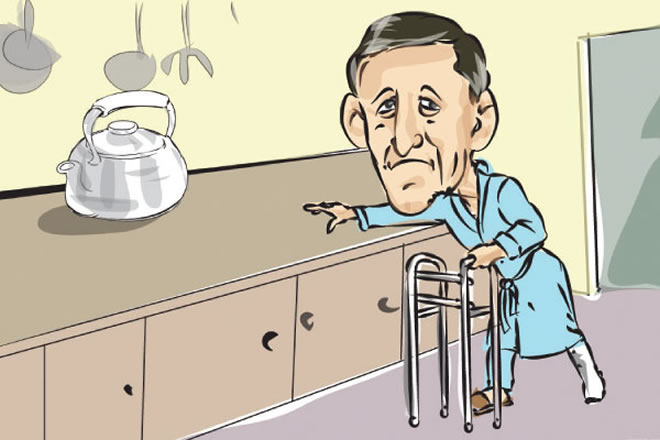
By JOHN FOX
Sunday, May 24, 2015

When this stiff leg is mended — the surgeon re-arranged some bones in my hip — one of my next assignments will be in Mogadishu. ILLUSTRATION| JOHN NYAGA
I spend much of my working time these days appraising donor-funded projects across Africa.
One of the most interesting issues we explore is whether a project has led to any unplanned outcomes, whether positive or negative.
I am home again after 15 long days and nights at the Nairobi Hospital, where the surgeon’s objective was to successfully re-arrange some bones and bits of metal in my left hip.
The nursing care was as good as it can be; and I am only now recognising some of the things I had taken for granted in the hospital — like, once home, the difficulty of getting out of bed when one of your legs is still stiff and painful after the surgery, or making yourself a cup of tea while also having to cling on to the “baby walker” frame that is going to be my close companion for the next few days.
But I also have the same kind of feeling I often get when I fly into Nairobi after a trip to Somalia.
Please don’t get me wrong — I am in no way insinuating that a couple of weeks in Nairobi Hospital is anything like as challenging as a couple of days in Mogadishu.
MY POINT
No, my point is that, having driven for many miles across the desert wastes of Somalia; having witnessed the barrenness of conflict-torn city streets; having been able to go nowhere without attendant security — driving home from JKIA I can feel again how lucky I am to live in such a vibrant, multi-cultural and progressive city as Nairobi.
You can even smile at the thought that it takes almost as long to get from JKIA to Lavington as it does from the Gulf of Aden to Nairobi. (But next morning I will be cursing again.)
So one very rewarding outcome of travel can be the re-appreciation of things back home: like making straight for chunks of bread and cheese after a month-long diet of rice and beans in Karamoja in Northern Uganda; like the peace of sitting on the terrace with my laptop and watching the changing patterns as the sunlight filters through the greenery of the garden’s trees, after some days marooned in a Catholic Church compound in Rumbek of South Sudan, when there is fighting going on in nearby villages.
So why do I go so frequently to such places? One answer, of course, is that I am earning money by doing it. But I passed my work sell-by date some years ago. No, there are more complex reasons than that. One of them has been flagged above when I used the word challenging.
As a youngster, I never could understand how vast hordes of Brits would make for the seaside resorts to lie out on the sands for hours on end to brown — or more often, burn — themselves in the sun.
I would rather spend my holidays camping in Cornwall, cycling through France, or climbing mountains in the Pyrenees.
When this leg is mended, one of my next assignments will be to run a workshop in Mogadishu. And it’s not just the shot of adrenaline that you get there; it’s not just the mixed sense of achievement and relief that you feel when you get home safe — there is something attractively challenging in the Somali people themselves.
If a Somali agrees with you, he will tell you so; if he disagrees with you, he will also tell you so — to your face. You might despair the clan competitiveness among the Somalis that has caused so much bloodshed over the years; but you have to respect the desire to make their own decisions and resist any imposed authority.
But I can’t describe the paradoxes better than the Irish writer, Gerald Hanley, did in his book, Warriors: Life and Death Among the Somalis. During the Second World War, Hanley was leading a platoon of Somali soldiers, for most of the time right out in the bush. This is something of what he says about the Somali character:
“Of all the races of Africa, there cannot be one better to live among than the most difficult, the proudest, the bravest, the vainest, the most merciless, the friendliest: the Somalis.”
I recommend Hanley’s book to anyone, soldier or development worker, who goes to work in Somalia.
But I have more immediate and pressing concerns. I had kept asking the surgeon, Dr Vincent Mutiso, how long it would be before I could drive again. And at the discharge he burst out laughing when I made a Freudian slip — or is it a Bantu slip? He asked me how the physiotherapy was going.
“Oh, very well,” I said. And since yesterday I have been practising hard on the crutches.